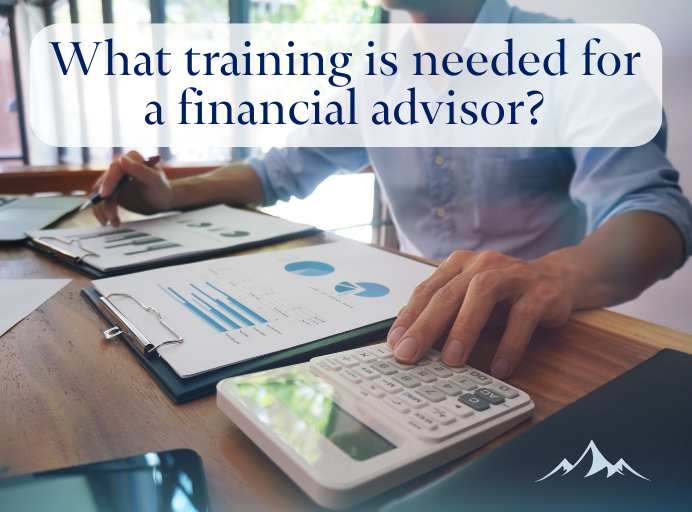
Planning for retirement can feel overwhelming. Between budgeting, investing, and figuring out Social Security and healthcare, many people don’t know where to begin. The good news? You don’t have to navigate this journey alone. There are professionals who specialize in retirement planning who may be able to guide you step-by-step to help toward a financially secure future.
But who exactly should you talk to? And how do you know they’re the right fit for your needs? Let’s break down the different types of financial experts and how to know which one may be right for you.
Who is the Best Person to Talk to About Retirement Planning?
When it comes to retirement, the stakes are high. The decisions you make today will impact your quality of life for decades to come. That’s why it’s essential to speak with someone who has experience, expertise, and a clear understanding of your goals. The best person to talk to about retirement planning depends on your unique situation, but here are the top options:
- Retirement Planners: Although not a recognized designation, a retirement planner is a self-conferred title for advisors who may focus specifically on retirement income, timing Social Security, and withdrawal strategies among other things.
- Certified Financial Planners (CFPs): Professionals with broad financial expertise, including retirement planning, who have met rigorous certification requirements.
- Investment Advisors: Useful if your primary concern is growing your nest egg through the right investment strategy.
- Tax Professionals: Help ensure your retirement plan is tax-efficient, especially with IRAs, 401(k)s, and RMDs.
- Estate Planners: These professionals may work with those who have complex assets or a desire to pass wealth to the next generation.
Ideally, you’ll want someone who understands all facets of retirement and can coordinate with specialists as needed. When you work with Vantage Point, we serve as the quarterback of your retirement team, helping you develop a holistic financial strategy that aligns with your retirement objectives.
How to Choose the Right Retirement Planning Professional for You
With so many financial titles out there—CFP®, investment advisor, CPA, and more—it’s easy to understand why you might feel unsure about who does what. The truth is, many of these roles can overlap, and the best choice depends on your specific goals.
If you’re looking for broad financial guidance throughout your life, like saving, investing, and managing taxes, a Certified Financial Planner (CFP®) may be a strong choice. For those approaching or already in retirement, professionals with more specialized expertise can help address key retirement challenges like generating income, optimizing Social Security, and minimizing tax burdens.
Credentials matter. Designations such as CFP®, RICP® (Retirement Income Certified Professional), or CPA (Certified Public Accountant) show that the individual has undergone rigorous training and adheres to professional standards.
The most important factor? Choosing someone who takes the time to understand your complete financial picture and has a structured approach to help you achieve your retirement goals.
Comparison of Common Retirement Planning Professionals
| Type of Professional | Focus Area | May be Best For | Common Credentials |
| Certified Financial Planner (CFP®) | Comprehensive financial planning, including retirement | Individuals wanting a plan that includes tax, income, investments, health care and legacy planning | CFP® |
| Investment Advisor | Portfolio growth and investment strategy | Those focused on building or preserving wealth | Series 65/66, CFA |
| Tax Professional | Tax efficiency in retirement | Someone interested in discussing taxable retirement income | CPA, EA |
| Estate Planner | Wealth transfer and legacy planning | Individuals with significant assets | JD, Estate Planning Attorney |
What Should I Look For in a Retirement Planning Professional?
Retirement planners are also advisors, and choosing the right advisor can make all the difference. When selecting someone to help with your retirement planning, consider the following:
- Credentials: Look for professionals with certifications like CFP®, RICP®, or CRC®.
- Comprehensive Services: A good retirement planner looks at more than just investments. They help with tax efficiency, estate planning, healthcare, long-term income, and legacy planning.
- Payment: Understand how they get paid—flat fee, hourly rate, or commissions.
Questions to Ask During Your First Meeting
When meeting with a potential advisor, it’s helpful to prepare a few key questions to better understand their approach and ensure they’re the right fit for your needs. Ask how they help clients transition into retirement, what their strategy is for optimizing Social Security benefits, and how they ensure retirement income will last throughout your lifetime. You might also want to know if they coordinate with other professionals like CPAs or estate attorneys, and how frequently they review and update retirement plans.
These five questions can give you valuable insight into their expertise and whether their services align with your financial goals:
- How do you help clients transition into retirement?
- What is your approach to Social Security planning?
- How do you help clients develop retirement income strategies that will last?
- Do you work with other professionals like CPAs or attorneys?
- How often will we review and update my plan?
If you’re asking, “Who can help me with retirement planning?”—you’re already on the right path. At Vantage Point, we specialize in guiding individuals and families. Whether you’re 10 years away from retirement or already enjoying your golden years, our team is here, seeking to help you live boldly and on your terms. Contact us today to get started.
Investment advisory services are offered through Vantage Point Financial, a registered investment adviser. Registration with any regulatory body does not imply any particular level of skill. This material is provided for informational purposes only and should not be construed as investment, tax, or legal advice. Working with a financial planner does not ensure financial success or prevent loss. All investments involve risk, including the possible loss of principal. Past performance does not guarantee future results. The scenarios presented are hypothetical and are intended for illustrative purposes only. They do not reflect actual client results and are not guarantees of future outcomes. Individual results will vary. Certain financial strategies may offer tax advantages, but outcomes depend on individual circumstances and are subject to change due to tax laws and other external factors. Vantage Point Financial does not provide legal or tax advice. Consult a tax professional. Retirement outcomes depend on a variety of factors, including individual savings behavior, market performance, health events, and other considerations. Certain statements herein may reflect the firm’s current views, expectations, or beliefs, which are subject to change without notice. For additional information about our services, fees, and disclosures, please refer to our Form ADV Part 2A, available at https://vantage-point.mwdevsite.com or upon request at no cost.









